TikTok has taken a significant step by initiating a dialogue with the Moroccan government to tackle growing concerns over the spread of negative content on the platform. This collaboration could pave the way for the opening of a local TikTok office, reflecting the company’s commitment to understanding Morocco’s unique cultural identity. The announcement was made by Mohamed Mehdi Bensaid, Minister of Youth, Culture, and Communication, during a parliamentary session at the Chamber of Councillors.
A cultural lens on TikTok content
Responding to questions about TikTok’s impact on Moroccan society, Minister Bensaid emphasized that the platform has agreed to work closely with the government to grasp the cultural essence of “Tamghrabit”—Morocco’s unique identity and values. This effort is part of a broader initiative to ensure that the content shared on TikTok aligns with local sensitivities and promotes respect for cultural norms.
Bensaid highlighted the importance of this partnership in preserving Moroccan values while upholding individual freedoms. The collaboration aims to strike a balance: combating inappropriate content without imposing blanket restrictions that could be bypassed through tools like VPNs.
Shared responsibility in safeguarding youth
The minister underscored that protecting young users from harmful content is a collective effort. While the government can implement policies and raise awareness, families play a pivotal role. “The responsibility starts at home,” he stressed, advocating for the use of parental controls to monitor and guide children’s online activity.
Additionally, Bensaid reaffirmed the importance of enforcing laws against defamation, slander, insults, and the spread of false information. He encouraged victims of online abuse to file complaints, ensuring that justice can take its course.
A regional alliance for digital challenges
Beyond addressing national concerns, Morocco is spearheading a regional initiative by forming a coalition with other Arab nations to tackle shared digital challenges. Highlighting the universal importance of cultural values in the Arab world, Bensaid called for unified efforts to engage with global tech giants—commonly referred to as GAFA (Google, Apple, Facebook, Amazon).
He described these platforms as “quasi-states” due to their global influence and stressed the need to convey that freedom of expression and cultural norms vary significantly across regions. The coalition seeks to establish constructive dialogue with these companies to ensure respect for local values and legal frameworks.
A TikTok office in Morocco?
The potential opening of a TikTok office in Morocco would mark a milestone in the company’s commitment to integrating Moroccan cultural nuances into its moderation policies. Such a move could facilitate smoother collaboration between TikTok and the government while addressing the expectations of Moroccan users.
Morocco’s approach with TikTok is part of a broader vision: fostering balanced partnerships with digital giants to ensure they respect local cultural and legal standards. This model could serve as an example for other countries in the region facing similar challenges in the digital era.
By embracing dialogue and cooperation, Morocco demonstrates its dedication to safeguarding its cultural heritage while navigating the complexities of a rapidly evolving digital landscape. This initiative signals a proactive strategy that could inspire regional and international collaborations, setting the stage for a more culturally sensitive internet.





